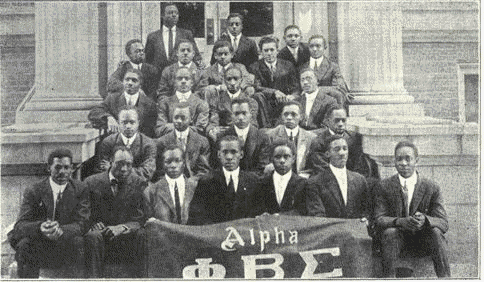
Fraternity history

Phi Beta Sigma Fraternity was founded at Howard University in Washington, D.C., January 9, 1914, by three young African-American male students. The Founders, Honorable A. Langston Taylor, Honorable Leonard F. Morse, and Honorable Charles I. Brown, wanted to organize a Greek letter fraternity that would truly exemplify the ideals of brotherhood, scholarship, and service.


OUR CAUSE SPEEDS ON ITS WAY

The Founders deeply wished to create an
organization that viewed itself as a part of
the community rather than apart from the
community. They believed that each
potential member should be judged by his
own merits rather than his family
background or affluence...without regard
to race, nationality, skin tone, or texture of
hair. They desired for their fraternity to
exist as a part of an even greater brotherhood that would be devoted to the "inclusive we"
rather than the "exclusive we."
From its inception, the Founders also conceived Phi Beta Sigma as a mechanism to deliver services to the general community. Rather than gaining skills to be utilized exclusively for themselves and their immediate families, they held a deep conviction that they should return their newly acquired skills to the communities from which they had come. This deep conviction was mirrored in the Fraternity's motto, "Culture For Service and Service For Humanity".
Today, Phi Beta Sigma has blossomed into an international organization of leaders. No longer a single entity, members of the Fraternity have been instrumental in the establishment of the Phi Beta Sigma National Foundation, the Phi Beta Sigma Federal Credit Union and The Sigma Beta Club Foundation. Zeta Phi Beta Sorority, founded in 1920 with the assistance of Phi Beta Sigma, is the sister organization of the Fraternity.

national programs

Phi Beta Sigma Fraternity, Inc. is founded on the principles of brotherhood, scholarship, and service. Over its one hundred plus years of existence, the Fraternity has focused on improving the global community through dedicated service. This focus has compelled the development of the organization’s four main programs: Bigger and Better Business, Education, Social Action and Sigma Beta Clubs that embrace these objectives:
Bigger & Better Business
01
Bigger and Better Business became the first national program of Phi Beta Sigma Fraternity. It was first introduced at the Tenth Anniversary Conclave, in Philadelphia, Pennsylvania (December 1924). When Bigger and Better Business was adopted as a national program, special emphasis was placed on encouraging and promoting Negro businesses. At its inception, the program sought to encourage Negro businesses to improve their business acumen, efficiency and service to the public, to be competitive with other businesses.
03
Education
The Education program developed from the Fraternity’s traditional emphasis on education academic achievement as an ingredient for success. During the 1945 Conclave in St. Louis, Missouri, the Fraternity engaged in a restructuring of its programming, leading to the birth of Education as an International program. The program focuses on providing a variety of services to alumni and collegiate members of the Fraternity, which in turn translates to services to local communities. In-house programs include providing scholarships, conferences, college fairs, mentoring and tutoring at local, regional and national levels.
Formed in 1934, the Social Action program was conceived by Bro. Elmo M. Anderson to focus on improving the general wellbeing of disenfranchised people. The mission of the International Social Action Program is to encourage social, political and philanthropic leadership which strengthens our respective communities
Social Action
02
The Sigma Beta Clubs of Phi Beta Sigma offer unique opportunities to exemplify wholesome values, leadership skills, educational enhancement, business training and development, and social and cultural awareness to male youths at a most critical stage in their personal development.
Sigma Beta Club
04
